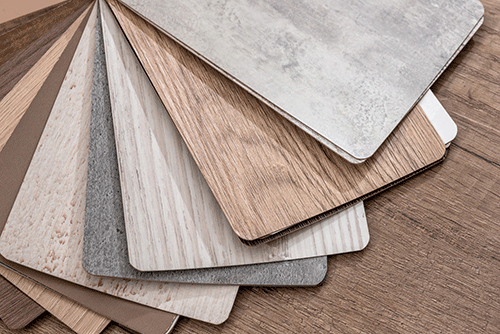We’ve talked about some of the top flooring materials that homebuyers are looking for, and there’s one particular type that merits further discussion: vinyl.
Vinyl flooring has come a long way over the years, and nowadays there are several different options to choose from. If you’ve been thinking about using vinyl floors for your next build, here’s what you need to know before making a decision.
Different types of vinyl flooring
There are three types of vinyl flooring:
- Tile, which has a similar look and feel to real tile or ceramic.
- Plank, which looks just as beautiful as any real hardwood floor.
- Sheet, which can look similar to real wood or real tile.
Each type of vinyl flooring tends to be more affordable than its wood or tile counterpart. Color is achieved by embedding color granules into the vinyl sheet (called inlaid vinyl) or by printing the ink onto the sheet. Inlaid vinyl produces a rich color and is a good option when the quality of the color is important to the finished product.
Pros of vinyl tiles
Vinyl tiles are incredibly versatile — they come in 12-inch or 18-inch squares and are available in a seemingly endless array of colors, patterns and textures.
You’ll have installation flexibility, too. Some types of vinyl tile can be grouted, just like real ceramic or stone, and they even look like the real deal. Tile manufacturers offer all the different color options you could want, and many don’t need to be sealed. Other types of vinyl tile can simply be laid end to end.
Either way, the vinyl tiles are waterproof and resistant to stains and cracks, so it’ll hold up well to everyday use.
Pros of vinyl plank floors
Vinyl plank flooring is an excellent alternative to hardwood, and you won’t sacrifice feel or texture. You can find vinyl planks in many of the same colors as real hardwood.
One major benefit to vinyl plank flooring is greater stain resistance and durability — homeowners won’t have to refinish these floors every few years or worry about scratches.
Pros of sheet vinyl floors
Sheet vinyl is what the name suggests: large sheets of vinyl that can be laid down easily. They typically come in prepared rolls or as 6-foot or 12-foot sheets. They can be cut down to the exact measurements needed for the room, and like their counterparts, can be made to look just like real tile or hardwood.
Because of their large size and seamless installation, sheet vinyl is a great option for rooms with high moisture levels. Bathrooms and mudrooms are two of the most common areas you’ll find sheet vinyl.
No matter what type of vinyl you choose for your next build, you can be confident that installation will be simple and the end product will look polished and professional.
Structural Warranties can protect builders and their buyers from devastating structural problems. But, maybe even more importantly, they give homeowners that all-too-important peace of mind that when something goes wrong, they’re covered. Become a member today!








